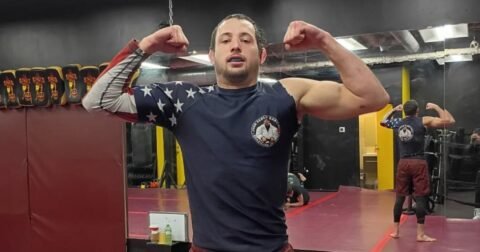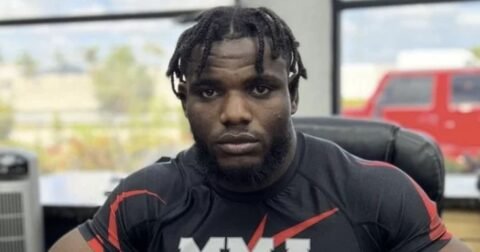Cain Velasquez’s restitution hearing is a crucial aspect of the legal proceedings that continue to unfold after his imprisonment. Having been sentenced to five years for serious charges, including attempted murder, the former UFC heavyweight champion now faces the financial implications stemming from his actions during the 2022 car chase. The intricate dynamics of the case revolve not only around the criminal charges but also highlight the victims’ pursuit of reparation. The upcoming hearing scheduled for June 3 aims to address the financial penalties Velasquez may owe to those affected by his reckless behaviour.
During the recent proceedings, Velasquez’s attorney, Renee Hessling, expressed that determining the appropriate restitution amount is complicated by the demands of the victims, who are reportedly seeking a substantial sum. This requires careful negotiation and exploration of the financial repercussions of Velasquez’s actions, which were fueled by personal trauma. As the restitution hearing approaches, the anticipation among all parties involved is palpable, with the hopes of resolving these financial obligations and moving forward.
Implications of Restitution in Criminal Cases
Restitution in criminal cases serves as an essential mechanism that allows victims to seek compensation for their losses, pushing for justice in the aftermath of crime. Under California law, victims like those in Cain Velasquez’s case are entitled to request restitution that reflects the financial impact of their suffering. Legal frameworks are designed to ensure that offenders, once convicted, are held accountable not just physically but financially as well. This aspect of the judicial process emphasises the necessity of addressing the real-life consequences of criminal actions.
In Velasquez’s situation, the concept of restitution gains an additional layer of complexity due to the high-profile nature of the case and the public interest surrounding it. The claim for $1 million in restitution, along with other financial demands related to the victims’ daycare, illustrates the significant stakes involved. The upcoming hearing is poised to delve into these financial intricacies, weighing the validity of each claim in light of California’s restitution laws and potentially shaping future precedents in similar high-profile cases.
The Fallout from the 2022 Car Chase Incident
The September 2022 car chase incident involving Cain Velasquez has left a profound impact not only on his life but also on the lives of the victims and their families. The dramatic events of that day, which included an 11-mile high-speed pursuit and gunfire aimed at a vehicle carrying Harry Goularte, underscore the emotional distress that led to Velasquez’s actions. The repercussions of that day continue to unfold as the legal outcomes—including criminal convictions and civil lawsuits—play out in courtrooms.
Beyond the criminal charges, the aftermath includes discussions of civil liability, particularly the lawsuit filed by Velasquez’s family against Goularte and the daycare. This duality of legal proceedings enhances the complexity of achieving a fair resolution, where the criminal case and civil claims intersect. The ongoing negotiations around restitution only add to the challenges faced, as Velasquez navigates a legal landscape rife with emotional and financial turmoil.
Victim Advocacy and Representation in High-Profile Cases
Victims in high-profile cases, such as that of Cain Velasquez, require robust legal representation to navigate the complexities of restitution and compensation. With the victims retaining their attorney for the restitution hearing, the importance of having dedicated advocates who understand their rights is highlighted. This ensures that their voices are heard in court and that they receive appropriate compensation for the damages suffered during the criminal incident.
The representation of victims is an integral part of the judicial process, especially when the media spotlight is on the case. Their legal advocates help to articulate the emotional and financial toll the crime has taken, influencing the court’s decision on restitution amounts. The ongoing dialogue between the defence and prosecution also underscores the importance of a cooperative approach in resolving disputes, ultimately aiming for a just and timely outcome.
Cain Velasquez’s Future: Parole Eligibility and Beyond
Cain Velasquez is currently serving his sentence at Wasco State Prison and is eligible for parole as early as March 2026. The prospect of parole brings with it a host of considerations, including not only Velasquez’s behaviour while incarcerated but also the outcomes of his restitution hearing and any civil lawsuits that may arise out of the shooting incident. These legal ramifications will shape public perception and the terms of his eventual release.
As Velasquez looks toward a future beyond prison bars, the close attention being paid to his case highlights the broader implications for similar high-profile individuals facing legal challenges. The repercussions of his actions, both criminally and financially, will follow him even after serving his sentence, marking a significant chapter in a life that once celebrated athletic accomplishments within the UFC.
The Role of Public Opinion in Legal Proceedings
Public opinion plays a significant role in shaping the narrative surrounding cases like that of Cain Velasquez. As a well-known figure in the UFC, the actions he took during the car chase have garnered extensive media coverage. This spotlight on Velasquez not only affects his reputation but also influences the perceptions surrounding his legal battles, particularly concerning the restitution claims brought forth by the victims.
The dynamics of public scrutiny can sometimes lead to increased pressure on the legal system to deliver what the public perceives as justice. For Velasquez, this means that his fight for restitution and parole occurs not just in the courtroom but also in the arena of public opinion. Navigating these waters will be crucial as he seeks to rebuild his life following his impending legal resolutions.
Understanding California’s Restitution Laws
California’s restitution laws aim to compensate victims for the losses incurred due to criminal activities, reflecting a commitment to justice and accountability. These laws entitle victims, like those in Cain Velasquez’s case, to seek financial reparations directly from those convicted of crimes during the legal process. This fundamental principle serves to restore financial balance to victims harmed by criminal acts.
As Velasquez prepares for his upcoming restitution hearing, it’s vital to understand how California law articulates a victim’s right to recover losses. These laws are particularly relevant in cases where severe emotional and material damages have occurred, like in Velasquez’s situation. Ensuring that victims’ claims are appropriately addressed reinforces the legal framework’s goal: to hold offenders accountable while providing a pathway for victims to seek justice.
Civil Lawsuits: An Extra Layer of Accountability
Alongside the criminal proceedings against Cain Velasquez, civil lawsuits introduce another layer of accountability that must be navigated. Velasquez’s family has initiated a civil suit against Harry Goularte and the daycare, seeking damages related to the events that transpired during the car chase. Civil litigation allows victims to pursue compensation for emotional distress, medical expenses, and other losses that may not be fully captured within the criminal justice system.
The intersection of criminal and civil matters creates a complicated legal environment, particularly for someone like Velasquez, who is facing simultaneous scrutiny in both arenas. The outcomes of these civil claims may impact the financial obligations he faces in the restitution hearing, emphasising the need for comprehensive legal strategies to address each facet of the case effectively.
The Importance of Legal Support for High-Profile Cases
Legal support plays a pivotal role in the outcomes of high-profile cases, such as Cain Velasquez’s ongoing legal battles. With the stakes high for all parties involved, having a knowledgeable and experienced attorney can significantly influence the trajectory of both criminal and civil proceedings. In Velasquez’s case, his attorney, Renee Hessling, must navigate the complexities of restitution demands while also preparing for the overarching implications of the criminal conviction.
The legal strategies employed will not only determine the course of Velasquez’s restitution hearing but will also set precedents for how similar cases are handled in the future. The complexity of intertwining restitution and civil liabilities demands diligent legal planning and negotiation, underlining the essential nature of having robust legal representation in high-profile legal matters.
| Key Points | Details |
|---|---|
| Cain Velasquez is sentenced to five years in prison after a no-contest plea to several charges, including attempted murder. | He is dealing with the aftermath of a car chase incident from 2022. |
| The latest court hearing focused on a restitution hearing that Velasquez did not attend. | His attorney, Renee Hessling, argued that the restitution amount requested by victims is excessive. |
| The judge set a new hearing date for June 3 to further address restitution claims. | Victims are seeking substantial financial restitution, including claims of $1 million related to daycare costs. |
| Restitution is mandated by California law, but the specific amount Velasquez will owe is still undetermined. | Velasquez’s family has also filed a civil lawsuit against the alleged molester and the daycare involved. |
| Prosecution and defence are expected to negotiate and litigate certain restitution claims before the next hearing. | Velasquez is eligible for parole as early as March 2026. |
Summary
The Cain Velasquez restitution hearing is a crucial legal proceeding as it addresses the financial implications of Cain’s actions following a car chase incident linked to a personal tragedy. During the recent court session, his attorney raised concerns about the high amounts requested by the victims, prompting a continuance until June 3 to resolve outstanding issues and the potential restitution owed. This case highlights not only the legal challenges faced by Velasquez but also the emotional toll on the victims involved, making the upcoming hearing significant for all parties.







